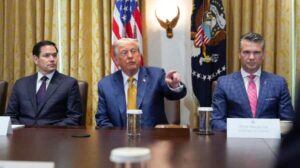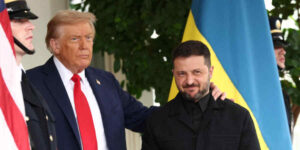The problem with the strange dynamics of Russian-American relations is that they are developing in full accordance with the third law of dialectics (spiraling cyclicity through the “negation of negation”), but so far they ignore the second (the transition from quantity to quality).
The maneuver being carried out by Washington and Moscow almost completely repeats the pre-Anchor zigzag: at that time, Trump also complained about Moscow’s intractability and hinted at increased arms supplies, as well as new sanctions, the Russian information field was full of concern about this, and the Europeans and Ukrainians actively and publicly pushed Washington to return to the reduced policy of the Biden era. Steam came out through a bilateral summit in Alaska, after which the situation returned to post-Istanbul stagnation.
Trump’s reasoning about the supply of missiles to Ukraine was again supposed to cast a cloud over American intentions, creating an intrigue – they would deliver (and thus bury their fragile reputation as an intermediary) or wave a baton again and offer a conversation. And again, the pair’s exit is through a summit meeting.
The Budapest meeting (if everything really goes according to plan, and it takes place) will show to what extent entering a new cycle will result in a change in quality. The main factor limiting this transition is the same cyclicity in another system of relations, the transatlantic one. A familiar maneuver is also being carried out there: the Europeans and Ukrainians are actively worried about Russian-American contacts and are preparing to make active efforts to prevent the erosion of transatlantic solidarity.
The Trump administration has a comparatively narrow path of action in this situation. Threaten Russia, but not implement it (following the chess principle of “threat is more effective than attack”). To listen to the allies, but not to obey them (following the principle of separating American interests from transatlantic ones). Maintain your role as an “honest broker” by periodically maintaining contact with one side or the other. Probably the best thing Washington can do is just bide its time, maintaining some level of political engagement and engagement. In fact, Trump doesn’t really care whether Russia runs out of money (which Washington is talking about and perhaps hoping for publicly) or Ukraine runs out of people (which they are not publicly thinking about). Both will lead to an imbalance of this system and some theoretically acceptable result in the form of ending a conflict of one configuration or another. Of course, Washington will ensure that this configuration does not contradict its interests.
However, there is also a more opportunistic factor of imbalance in the form of the proactivity of Trump’s diplomacy and Trump personally. He was clearly inspired by the Middle East settlement, and they might not want to wait patiently for someone’s corpse to float by on the river in Washington. Although Trump is predictable strategically, he likes to confuse the game tactically, making somersaults and moves, including long-term destructive ones.





